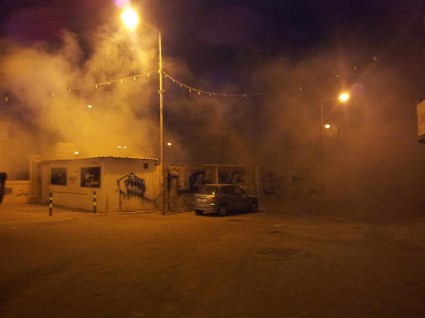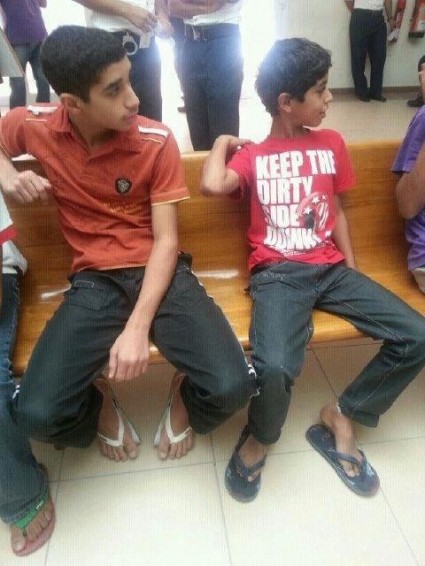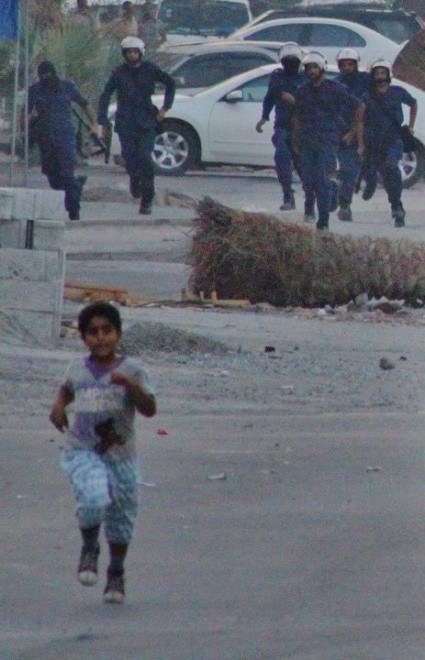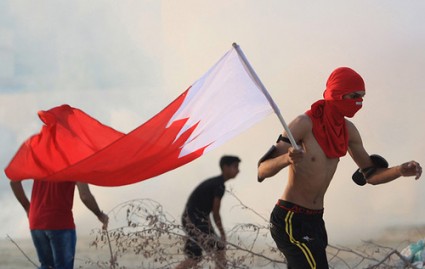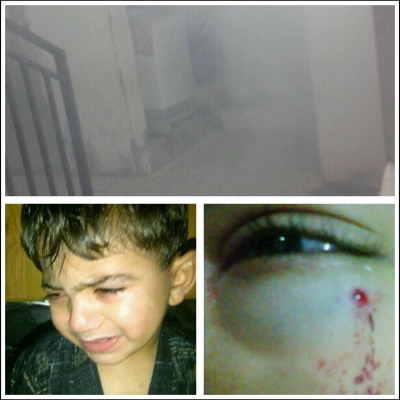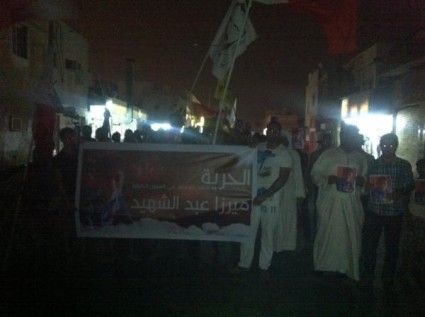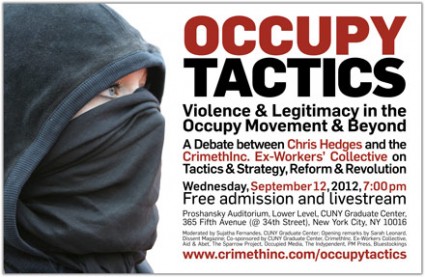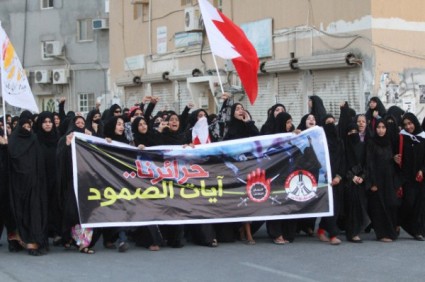Rioting Automobile attacked by Bahrain Security Forces with CS Gas – A little excessive Timoney – you think?
August 30, 2012 No Comments
Bahrain Regime ‘Child Trials’ intended to terrorise the families and Villages of the ‘Kidnapped’
Bahrain: Trialing Children with Political Charges and Fears of Abuse
Bahrain Youth Society for Human Rights- 30 August, 2012
The Bahrain Youth Society for Human Rights (BYSHR) expresses its great concern regarding the local authorities’ arrest of children who are less than 16 years of age on charges of participating in protests and accusing them of criminal charges.
The local authorities arrested S. Ali Mustafa Al-Muhafdha – 16 years old – on 14 June and he was accused of “assembling, possession of Molotov and attacking security patrols”.
According to the information received by the BYSHR from the S. Ali’s family, he suffers from very poor health and the officials at the “Dry Dock Prison” refuse to transfer him to a specialized doctor.
In July 2012, the local authorities arrested Mohammed Abbas Al-Mulani – 16 years old –Mohsen Mohammed Al-Arab – 13 years old – Mirza Abdul-shaheed Mirza – 12 years old – and they were accused of “criminal arson”.
The judge refused to release them and kept Al-Arab and Mirza in juvenile prison, and as to Al-Mulani he was transferred to “Dry Dock Prison”.
The local authorities accused these children of charges related to the political situation in the country and especially during the recent escalation of protests in Bahrain.
The BYSHR fears that children are being ill-treated given the past mistreatment the BYSHR had monitored before towards those accused in cases related to the political situation in the country, and emphasizes that the judiciary is not independent or unbiased in dealing with such cases.
The Bahrain Youth Society for Human Rights (BYSHR) demands the authorities to immediately release the children and to stop all kinds of arbitrary arrests of children and accusing them of political charges, and to independently and objectively investigate the claims of mistreatment in prison. …source
August 30, 2012 No Comments
US State Department: Syria Regime Change Must Be ISO Certified
U.S. training opposition how to administer ‘liberated’ Syrian towns
By Jill Dougherty – CNN
As more areas in Syria slip from control of the Syrian military, the United States is training local opposition members how to run a local government free from the grip of the Assad regime.
The State Department says it is running “training programs” for the members of opposition local coordinating councils in “liberated” areas who are beginning to re-establish civilian authority. The programs help them on issues of civil administration, human-rights training and other services.
The council members are learning “the kinds of things that they might need from the international community as they begin to rebuild their towns,” State Department spokeswoman Victoria Nuland said in her Wednesday briefing.
“They’re asking for help in how to budget. They’re asking for help in how to keep utilities running. How to ensure that the institutions of the state that, you know, provide services to the population, come back up and running. So we are open to supporting all of those kinds of needs,” she explained.
Nuland called it a “first round” of training, tailored to help form a nascent democratic society, even before President Bashar al-Assad is gone.
“It also gives us an opportunity,” she said, “to talk to them about inclusion and protection of minorities and all those things.” The first step is to assess the need, she explained. Training could get more detailed as the opposition requests what it needs from the international community.
Concerned for the security of the new administrators, State Department officials are reluctant to provide details of the training programs, but Nuland said the department is running the programs outside of Syria for those who can exit and return to Syria. For those who remain inside Syria, there are what she called “pretty extensive contacts.”
In addition, the department runs programs in Istanbul that train Syrian student and women leaders, as well as members of the media, in areas like justice and accountability.
Just how much of Syria is out of regime control is unclear. Nuland said it is a “mixed picture.”
“Great swaths” of the country have now been wrenched away from the regime in the north and the east and, increasingly, between some of the major towns, she said, but the fighting is intense in Aleppo, Damascus and some of the major population centers. …more
August 30, 2012 No Comments
Non-Aligned Movement Works Toward Solution to Syria Crisis
Can NAM Solve the Syrian Crisis?
By: Vijay Prashad – 30 August, 2012 – Al Akhbar
The 16th Non-Aligned Movement(NAM) summit opened on Sunday in Iran, with two-thirds of the world’s governments gathering in the Iranian capital. The NAM, since the 1980s, has been notably adrift. The debt crisis of the 1980s and the emergence of US primacy after the fall of the USSR at the end of the decade created a major crisis in the Global South. As the states of the South became to seek new alignments with the North out of economic needs or political ambitions, the agenda of the NAM fell by the wayside.
A combination of the cowboy wars led by the US and NATO (since the Bush administration) and the financial crisis (since 2007) alongside the economic rise of China and India has, however, given a boost to the aspiration of the NAM. The assertions of the BRICS (Brazil, Russia, India, China, South Africa) in the 2012 Delhi Declaration and the solidarity of the South at UNCTAD XIII in Doha in April of this year underlined the emergence of this new confidence.
The South’s mood has been further enlivened over the past five years by the emergence of popular movements that oppose neoliberalism and imperialism.
The South’s mood has been further enlivened over the past five years by the emergence of popular movements that oppose neoliberalism and imperialism. Their first stand was in Latin America, where the social and political movements were able to translate their popularity into the electoral domain. Most of the governments south of the Rio Grande River now oppose US primacy. In 2010, these Latin American states created the Community of Latin American and Caribbean States to undercut the formerly US-dominated Organization of American States.
The Arab Spring of 2011 offered further proof of the new confidence of the people of the ‘South’. Regimes that had given themselves over to pro-Western economic policies and opened their prisons to become the “black sites” of the War on Terror fell like ninepins. If the US had lost Latin America, it was now feared that it would lose the Arab world as well.
The Syrian Conundrum
NATO’s war in Libya and the Syrian crisis has afforded the US an opportunity to re-enter the Arab world as a major political player. This is what makes the Syrian crisis so central to the work of the NAM – apart, of course, from the more humane objective, which is to end the violence against the Syrian people. A cynical set of geopolitical calculations has made each side to this conflict take maximum positions, which rendered Kofi Annan’s mission to Damascus impossible. It is essential to create the political context for Lakhdar Brahimi, Annan’s successor, to be able to move an agenda.
One small part of the process to create the policy space for Brahimi has been proposed by Egypt – the Contact Group. The group will include all the major regional players: Egypt, Iran, Saudi Arabia, and Turkey. The NAM meeting was to be the setting to increase confidence for the Contact Group. If the NAM gives its endorsement to this Contact Group, it might be able to create a regional roadmap, allowing Brahimi and the UN to try and find a procedure to end the violence in Syria.
To have Iran and Saudi Arabia in the same process is both startling and a sign of hope.
Saudi Arabia will be represented by Prince Abdul-Aziz bin Abdullah, the son of King Abdullah. He is a popular prince who is the acting Deputy Foreign Minister. The entire top brass of Iran will be in attendance. To have Iran and Saudi Arabia in the same process is both startling and a sign of hope. Trapped by its own regional alignments, Iran has yoked itself firmly to the Assad regime. Saudi Arabia and Qatar have thrown in their lot with the rebellion, as has Turkey but with less fanfare. Such “unity” was not available at the Arab League summit in March that was held in Baghdad. The Saudis and the Qataris refused to send their top leadership because of their serious difference of opinion with both Syria and Iraq. Qatar sent minor bureaucrats and the Saudis sent their Arab League ambassador, Ahmed Qatan. No princes graced the occasion.
The government of Iraq’s Prime Minister Nouri al-Maliki had refused to stop Iranian aircraft from going through their airspace to Syria, and Baghdad was not willing to join in the isolation of Syria. The ground has shifted since March, and now the regional powers seem willing to see if cooperation is possible in order to bring stability to Syria and the region.
Turkey has, unfortunately, refused to come to the NAM meeting. It is not a NAM member, but it has been invited to attend as an observer. There is a precedent for this, since Australia will be in Tehran as the West’s listening post and has threatened to walk out if anything it deems inappropriate is said.
Foreign Minister Ahmet Davutoglu will not attend, and neither will the top leaders of his party in the government. Davutoglu, an academic, has developed a foreign policy that Hurriyet’s editor Yusuf Kanli called “no friends in the neighborhood” strategy. …more
August 30, 2012 No Comments
Under Intense International Criticism, Bahrain Regime Charges Murderous Policeman – conviction doubtful
Clearly the regime caved into international pressure as they prepare another ruse to placate the US State Department in a bid to preserve their friendly” relationship. The real crime lies in the MOI arming derelict police officers with lethal ammunition for ‘riot control’. The images of Hussam’s wounds clearly indicate the use of illegal, metalized shot – probably #5. Arming a largely illiterate, foreign national police force that has no tie or accountability to the communities they police, while not criminal, is a recipe for police violence with impunity. The MOI lays naked in hypocrisy with yet another ‘charge’ against police officers in a system that directs, rape, murder, torture and false imprisonment. The charade of compliance and pretense of accountability fools no one, except perhaps a complicit or at best a horribly naive US State Department. Phlipn – out.
Bahrain police charged over Shiite teenager death
30 August, 2012 – Lebanon Now
A Bahrain policeman has been charged over shooting dead a Shiite teenager when a group of protesters attacked security forces with petrol bombs, an investigator said.
The public prosecution “accused the policeman who opened fire on one of the attackers of premeditated murder,” said official, Nawaf Hamza, late on Wednesday, according to BNA state news agency.
He said the accused was released but has been banned from travel. His name and nationality have not been revealed.
But the public prosecution issued a later statement saying the charge against the policeman was “preliminary”, pending an investigation which so far shows the killing was “likely a case of self-defense.”
Sixteen-year-old Shiite Hussam al-Haddad died of his injuries on August 17, after police opened fire under attack from petrol bombs in Sunni-dominated Muharaq, close to the capital, according to the interior ministry.
The Sunni-ruled kingdom, home to the US Fifth Fleet and strategically situated across the Gulf from Iran, has continued to witness sporadic Shiite-led demonstrations mostly outside the capital since it crushed a pro-democracy uprising in March last year.
Hamza said the investigation revealed that police fired warning shots at 25 to 30 protesters attacking their patrol with petrol bombs, and that the defendant shot Haddad as he was about to hit him from close range with a Molotov cocktail.
The ministry had said at the time that security forces acted in self-defense.
The main Shiite opposition group, Al-Wefaq, condemned the “barbaric” attack on the teenager.
It posted pictures on its Facebook page of Haddad’s injuries, including shotgun wounds to his back and right arm. Bahraini security forces have widely used shotgun pellets and tear gas to disperse protesters.
…more
August 30, 2012 No Comments
UN Human Rights Rapporteurs lose credibility with every rhetorical call for regime action in Bahrain – Substance not empty words
U.N. Rapporteurs Call for Rights Compliance in Bahrain
28 August, 2012 – POMED
Last week, several U.N. human rights rapporteurs called on the Bahraini government to “comply with the rights to peaceful assembly and expression and immediately release those arbitrarily detained for exercising their legitimate freedoms.” Special Rapporteur on human rights defenders Margaret Sekaggya said “The sentencing of Nabeel Rajab represents yet another blatant attempt by the Government of Bahrain to silence those legitimately working to promote basic human rights.” Maina Kiai, the Special Rapporteur on freedom of peaceful assembly and association, contended that “the exercise of the right to freedom of peaceful assembly should not be subject to prior authorization from the authorities.”
Meanwhile, Bahraini human rights activist Maryam al-Khawaja wrote a letter to Egyptian president Mohamed Morsi to protest her recent barring and deportation from Egypt. In the letter, al-Khawaja decried “unlawful and hostile treatment [she] was subjected to at Cairo’s International Airport” after she was prevented from entering the country for “top secret reasons.” She was allegedly threatened with deportation back to Bahrain, where there is a warrant for her arrest. In April, al-Khawaja was also initially denied entry into Egypt, though she was let in after receiving the help of a lawyer and Egyptian activists.
In Bahrain, reports have emerged that the government ordered the transfer of Sunni cleric Adel Hassan al-Hamad from a prominent mosque to a less-prestigious position after al-Hamad described a land donation to the Catholic church as “an attempt to please Western nations.” The cleric warned that “silence in such matters could drag divine consequences” when urging his followers to act on the development. Justin Gengler examines al-Hamad’s actions and demotion in the larger context of the government’s “balancing act” with Bahraini Sunnis, and notes that dozens of Sunni cleric opposed the announcement of the church’s construction.
Finally, Abdulhadi Khalaf contends that Bahrain’s ability to sustain power through massive popular unrest stems from two factors: the United States’ reticence to pledge support to protesters like it did in Egypt and the composition of the Bahraini military which excludes “two-thirds of the indigenous population” from serving, and arrangement that allows “the Bahraini regime to remain confident that its military and security forces will remain loyal.” …source
August 29, 2012 No Comments
Bahrain Secuirty Forces Hunt Children in effort to Terrorise Villages
August 29, 2012 No Comments
Hegemonic Triad: USA-Saud-Israel – invent the ‘Pariah State’, Iran as they plunder MENA with Weapons Greed
Study says U.S. worked out policy goal with Arab allies in the Gulf to build a regional missile defense system to protect cities, oil refineries, pipelines and military bases from possible Iranian military attack.
U.S. tripled weapons sales in 2011 to counter Iran’s threats, study shows
By DPA – 28 August, 2012- Reuters
The United States tripled weapons exports last year, mostly to allies in the Middle East in a major drive to counter Iran’s ambitions in the region, a new study for the U.S. Congress said Monday.
The study by the non-partisan Congressional Research Service, a division of the Library of Congress, said U.S. weapons exports totaled $66.3 billion in 2011, out of a global weapons market of $85.3 billion.
By contrast, Russia’s arms exports stood at a distant second at $4.8 billion in the same year.
The study said the 2011 figures for U.S. arms exports constituted an “extraordinary increase” in just one year over the $21.4 billion in 2010 sales. The U.S. exported weapons worth $31 billion in 2009.
Saudi Arabia, the United Arab Emirates and Oman were major buyers of U.S. weapons at record levels last year, the study said.
In addition, the U.S. had worked out a policy goal with Arab allies in the Gulf to build a regional missile defense system to protect cities, oil refineries, pipelines and military bases from possible Iranian military attack.
In agreements with the U.S. worth 33.4 billion dollars last year, Saudi Arabia agreed to buy 84 advanced F-15 fighters, ammunition, missiles and logistics support and pay for upgrading 70 of the F-15s. The U.S. also sold military equipment that included dozens of Apache and Black Hawk helicopters to the Saudis.
The UAE purchased a Terminal High Altitude Area Defense and an advanced antimissile shield, which includes radars, which were valued at $3.49 billion, as well as 16 Chinook helicopters for $939 million.
Oman bought 18 F-16 fighters for $1.4 billion, the study said. …source
August 29, 2012 No Comments
Expose London’s arms trade on 29th September
Expose London’s arms trade on 29th September
29 August, 2012
2 ½ hours on your bike. 9 arms companies. (Or 1 hour on foot and 3 arms companies!)
The global arms trade is on our doorstep. Conflict, repression and destruction around the world are fuelled by the weapons made in the UK. One year before one of the world’s largest arms fairs is due to take place to London, we want to expose the arms companies and show that wherever they operate there is opposition.
So, in one afternoon we’re going to visit nine of them! Anonymous buildings in Central London will be cordoned off with hazard tape and giant signs erected showing the real business that goes on.
Finmeccanica, just one of the companies we plan to highlight, has sold attack helicopters to Turkey for use against the Kurdistan Workers Party (PKK), military helicopters to Algeria for “battlefield and internal security requirements”, a border control and security system to Libya, drones to Pakistan, armoured vehicles to Oman. Others we will visit have sold weapons which were used to aid repression in Bahrain, and regularly supply one of the most repressive regimes in the world, Saudi Arabia.
Join us as we show that This is NOT OK.
If you’re on foot, meet at:
2pm at MBDA, 11 Strand, WC2N 5RJ (nearest tube: Charing Cross)
then proceed to
2.45pm at BAE Systems, 6 Carlton Gardens, SW1Y 5AD
If you’re on a bike, be at MBDA, 11 Strand, WC2N 5RJ, promptly at 2pm to join the critical mass cycle that will target nine arms company sites in just 2 ½ hours!
August 29, 2012 No Comments
US Arms Sales hit a record $66 billion – Villains Required to Justify Sales
Top gun: Saudi, India deals push US arms sales to record $66 billion
by Uttara Choudhury – 29 August, 2012 – First-Post World
New York: The Congressional Research Service’s annual survey of global arms sales shows the US to be the world’s top arms merchant. The US sold $66.3 billion of weapons overseas in 2011, cornering nearly 78 percent of all global arms sales, which rose to $85.3 billion in 2011.
Predictably, concerns about chest-thumping Iran fueled arms sales to the Middle East especially to pro-US allies like Saudi Arabia and the United Arab Emirates. The Saudis, who have never really got along with Iran and sparred over Islamic leadership in the Persian Gulf, bought 84 advanced F-15 fighters from the US. Territorial disputes between Iran and the United Arab Emirates over three islands in the Gulf have flared recently, with Washington voicing support for the United Arab Emirates’ stance.
But many of the weapons are also being purchased by Asian countries like India and Taiwan which are on a tear to modernize their armies, said the annual report, written for Congress by Richard Grimmett and Paul Kerr. The report noted that India has begun to modernize its old, Soviet-era military equipment and technology and diversify its weapons supply base.
Saudi Arabia was the biggest arms buyer among developing countries, concluding $33.7 billion in weapons deals in 2011, followed by India with purchases of $6.9 billion and the United Arab Emirates with $4.5 billion. Washington also sold around $2 billion worth of antimissile batteries to Taiwan; a deal that stung the Chinese and caused tension during a diplomatic Chinese military visit last July.
“In 2011, the US led in arms transfer agreements worldwide, making agreements valued at $66.3 billion (77.7% of all such agreements), an extraordinary increase from $21.4 billion in 2010. The US worldwide agreements total in 2011 is the largest for a single year in the history of the US arms export program,” noted the report prepared for the US Congress.
While Washington posted “a clear outlier figure” and remained the world’s leading arms supplier, nearly all other major suppliers, except France, saw declines in 2011. Russia, the world’s number two arms dealer got a bloody nose as sales nearly halved to $4.8 billion in 2011. Things were much happier for France which signed arms sales valued at $4.4 billion in 2011, up from $1.8 billion a year earlier. …more
August 29, 2012 No Comments
Israel Analysts vilify Iran in disaster laden US-Saudi Oil and Weapons Greed Conspiracy
Here is an interesting piece from The Israeli Times. While its main purpose is clearly vilification of Iran and fear mongering, it also points to the ‘vulnerability’ of the Saudi Oil Supply and reliance there on. The vulnerability is in the foolish reliance on a single point of failure in the Western oil supply-chain. This model of greed uses the intersection of cheap oil and the cost to secure it. The weapons profiteers enjoy a windfall as the US Weapons Sales hit records in the necessity to protect it. Phlipn.
How Iran could get Carte Blanche in the Middle East — without a nuclear weapon
By Mitch Ginsburg – 28 August, 2012 – The Times of Israel
A cyber attack earlier this month highlighted the vulnerability of the Saudi oil industry, on which so much of the world depends. A recent simulation showed that a full-scale terror attack at Abqaiq, where Saudi Arabia processes six million barrels of oil a day, would hugely bolster Iran and bring economic ruin to parts of the world.
Saudi Aramco, a corporation worth hundreds of billions of dollars and the world’s largest producer of oil, came under cyber attack on August 15. A sophisticated malware weapon destroyed 30,000 of the company’s computers.
In a message on an online bulletin board the attackers called themselves the “Cutting Sword of Justice,” a group unknown to cyber security experts, and said that the attack was retribution for “oppressive measures” taken by Saudi Arabia in the Middle East. The group specifically cited Saudi involvement in Syria and Bahrain — two countries where the Saudi government has reportedly aided Sunni factions in their struggle with the Alawite regime and the Shiite majority, respectively.
Officials at Saudi Aramco said this Sunday that “our core businesses of oil and gas exploration, production and distribution from the wellhead to the distribution network were unaffected and are functioning as reliably as ever,” according to Reuters. It said that the attack had come from “external sources” and that the investigation was ongoing.
This wasn’t the first time that the Saudi oil industry was targeted. Six years ago, Saudi Aramco dealt with a more direct attack. On February 24, 2006, at 3 p.m., a car driven by a suicide bomber exploded at the gate of its Abqaiq oil facility. A second car, loaded with 2,000 pounds of ammonium nitrate as well as unknown quantities of high-grade explosives, crashed through the hole made by the first car and hurtled toward the heart of the oil facility, in the desolate, parched, Shiite-majority Eastern Province of Saudi Arabia.
Abutting one of the world’s largest oil fields with proven reserves of 17 billion barrels, Abqaiq processes two thirds of all Saudi Arabian crude oil. More than six million barrels flow daily through the facility. There the gas components of the oil are stabilized and made safe, stripped of sulfur (made “sweet”), and readied for transportation.
Saudi national guardsmen and a squad from the elite Special Emergency Forces stopped the second car a mile inside the facility, according to the Center for Strategic and International Studies in Washington, DC. Several guards were killed in the initial explosion. The damage to the facility was minor; the Saudi Interior Ministry said the sum total of the damage to the site was “a small fire.” Even so, the price of oil, in a market hypersensitive to risk, rose by two dollars a barrel.
Like this month’s cyber attack, the 2006 terror attack, launched by the subgroup called Al-Qaeda in the Arab Peninsula, was largely unsuccessful and caused no long-term damage. But the two strikes hinted at the vulnerability of the Saudi oil industry, on which so much of the world depends.
Earlier this year, a group of international experts at the Herzliya Conference imagined a very different scenario — a far more drastic one — in which a sophisticated attack on Abqaiq was directed by Iran and carried out from within. In the simulation, a series of explosions, along with a cyber-weapon, crippled the facility.
An illustration of Saudi Arabia’s oil facilities and shipping routes (Photo credit: Courtesy: Institute for Policy and Strategy and the Interdisciplinary Center Herzliya)
An illustration of Saudi Arabia’s oil facilities and shipping routes (Photo credit: Courtesy: Institute for Policy and Strategy and the Interdisciplinary Center Herzliya)
The results of this simulated attack, detailed here in full for the first time, were profoundly disturbing. The price of oil skyrocketed to over $200 per barrel. The House of Saud, and the territorial integrity of the kingdom, were existentially threatened. Saudi Arabia’s neighbors — Jordan, Iraq, the UAE, Bahrain, Qatar, Kuwait and Oman — were destabilized. Developing countries that use oil for electricity were propelled into war, both civil and external.
And Iran, the world’s third-largest producer of oil, authoritatively recognized as the perpetrator of the attack, reaped the rewards, its influence growing throughout the Middle East as the demand for oil outpaced the supply, and the Shiite populations in the Gulf — increasingly unrestful throughout the Arab Spring revolutions — rose up in arms.
“The simulation showed that global over-reliance on Saudi oil and our over-reliance on Saudi stability, would give Iran, in the case of such an attack, carte blanche in the Middle East — and that’s without a nuclear weapon,” said Tommy Steiner, the author of the report and a senior research fellow at the Institute for Policy and Strategy at the Interdisciplinary Center Herzliya. “Even small-scale meddling” — Sinai-style vandalism along the 11,092 miles of pipeline that crisscross the desert kingdom — “would be enough to significantly increase Iran’s standing.” …more
August 29, 2012 No Comments
Respect Sitra or Expect Resistence
August 29, 2012 No Comments
Children abused in indiscriminate attacks by Police in Bahrain Villages
A serious bird-shot eye injury and lethal tear gas fired inside a house by the regime forces
24 August, 2012 – Al Wefaq
August 29, 2012 No Comments
The ceaseless ‘false flag’ campaign against Iran
Police Case for Iranian Bomb Plot Based on Tainted Evidence
by Gareth Porter – 29 August, 2012 – AntiWar.com
In the three-part series “The Delhi Car Bombing: How the Police Built a False Case,” award-winning investigative journalist Gareth Porter dissects the Delhi police accusation against an Indian journalist and four Iranians of involvement in the Feb. 13 bombing of an Israeli embassy car.
The “Special Cell” of the Delhi police has identified an Iranian, Houshang Afghan Irani, as the man it believes carried out the Feb. 13 car bombing at the Israeli embassy in New Delhi that injured the wife of an embassy official. The police believe three other Iranians were also involved in the plot.
But major questions about the integrity of evidence put forward to prove the existence of an Iranian bomb plot cast doubt on that claim, which is the centerpiece of the Israeli accusation that Iran has been waging a campaign of terrorism against Israelis in as many as 20 countries.
Only Indian journalist Syed Mohammed Ahmad Kazmi has been officially charged in the case, and even the treatment of Irani and the other Iranians as suspects depends very heavily on “disclosure statements” supposedly made by Kazmi but denounced by the journalist as police fabrications.
Although the Special Cell (SC) also claims to have forensic evidence of Irani’s link to the bombing, the evidence appears to be tainted by improper police procedures.
A central problem for the SC case is that it has no eyewitness testimony for its contention that Irani planted the bomb on the Israeli embassy car.
A hotel security camera showed that Irani left the hotel the morning of the explosion wearing a black jacket. Irani had also rented a black Honda Karizma. But eyewitness Gopal Krishanan, who was driving the car that was directly behind the embassy car and thus had a clear view of the motorcycle rider when he attached the bomb to the rear of the car, said he was certain the rider had a red motorcycle and was wearing a red helmet and red jacket.
The police were convinced by his testimony. Tal Yehoshua-Koren, who was injured in the attack but was able to get to the Israeli embassy without assistance, later told investigators she thought the attacker had been riding a black motorcycle and wearing a black jacket and helmet. A senior police officer involved in the case told the Indian Express, however, that Yehoshua-Koren could not be certain of the color of the motorcycle.
The police continued to search for a red motorcycle after obtaining her statement, as was widely reported in the Indian press. Only after the SC decided that Irani was the bomber did the police switch to the position that the bomber had been riding a black motorcycle and wearing a black helmet and jacket.
Irani became a target of the investigation after the SC learned that a phone number associated with Masoud Sedaghat Zadeh, one of the three Iranians staying in a Bangkok house where an explosion occurred Feb. 14, had allegedly contacted the Indian mobile phone number being used by Irani.
The charge sheet does not include documentation for the claim that Irani’s phone had been called by that of the accused in the Bangkok explosion. And Irani’s receipts shown in the charge sheet for the moped purchased in April 2011 and for the motorcycle rented in early 2012 list Indian mobile phone numbers different from the one cited as having been contacted by Zadeh.
Irani made no effort to hide his identity in either of those transactions, so there would be no reason for him to write a false number on the receipt.
The police claim to have recovered from Irani’s hotel room seven items on which the government’s Central Forensic Science Laboratory found traces of TNT — the same explosive that the bomb affixed to the embassy car contained.
But the SC violated several police procedures in regard to that evidence, suggesting that it may have been planted by the Special Cell. …more
August 29, 2012 No Comments
Regime enages in Systematic Terror using Child Abuse
“Mirza Abdul-Shaheed Mirza” of Bahrain, Youngest Political Prison Ever
Local Editor – Al-Manar News
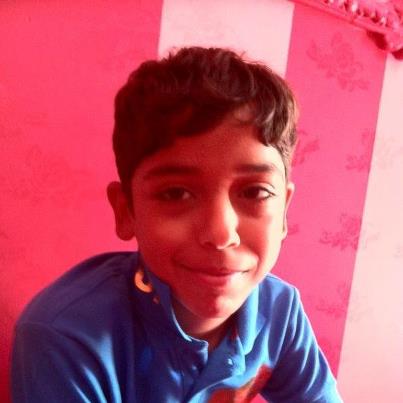
Mohsen Mohammad Sadiq Al-Arab (left) and Mirza Abdul-Shaheed Mirza (right) inside the Bahraini courtBahraini authorities extended the arrest period of the two kids “Mirza Abdul-Shaheed Mirza, 12 years, and Mohsen Mohammad Sadiq Al-Arab, who hasn’t completed his 13 years yet, after being accused of political charges.
With the detention renewal, Mirza becomes the youngest political prisoner in Bahrain and the world, sitting in the authorities prisons in the capital Manama with the child Mohammad Mohsen Sadiq Al-Arab since the twenty-one days.
Both kids were accused of political charges for participating in the demonstrations demanding reforms in the Gulf island.
The Bahraini political prisoner Mirza Abdul-Shaheed Mirza, 12 years.In addition to Mirza and Al-Arab, the Peninsula Shield-backed Bahraini security forces arrested the child Mohammad Abbas Al-Molani, 16 years, for his participation in the protests demanding freedom in Bahrain.
The Bahraini Al-Wefaq opposition group said that “this case presented a flagrant model of the escalating violence committed by the Bahraini authorities against human and child rights.”
Al-Wefaq stressed that Bahraini regime violates child rights on a daily basis through the continuous suppression against the peaceful protests in cities and villages, along with “arbitrary” arrests and issuing the verdicts which represent a model of “political persecution” and a false image of justice.
According to Al-Wefaq, “the arrest renewal against the children in Bahrain is a model of injustice provisions issued by the international community and the United Nations.”
August 29, 2012 No Comments
In Bahrain, Mercenary Military-Police Force, US-Saudi Support keep regime in power
Bahrain’s Military Is Closely Tied to the Monarch
Abdulhadi Khalaf – 28 August, 2012 – NYT Opinion
That Bahrain has been able to weather the turmoil that has brought down other authoritarian rulers in the Arab region may be explained by two characteristics in the Bahraini situation.
The first is the different position taken by the U.S. administration toward popular protests against authoritarian regimes in the Arab region. The U.S. role has been crucial in shaping the outcomes of the popular protest in Tunisia, Egypt and Yemen. Its active role in the militarization of the popular protests in Libya facilitated the fall of the Libyan dictator. The U.S. political and logistical support remains crucial to sustaining the Syrian opposition groups.
It is a different story in Bahrain, which also happens to be the headquarters of the U.S. Navy’s Fifth Fleet. The Obama administration, fearful of alienating Saudi Arabia, has not offered protesters in Bahrain the level of support it has given to Arab protesters elsewhere. The resumption last May of American military supplies to the Bahraini government has hardened the regime’s intransigence.
The second feature relates to the role military and security forces have played once the protest started. In Tunisia and Egypt, the military and security forces rapidly distanced themselves from the regime, thus facilitating their rapid fall.
Unlike the rest of the Arab region, the rank and file in the Bahraini military, police and security forces consist almost entirely of foreign recruits. Most of its officers and noncommissioned officers are members of the ruling family and its allied tribes. Bahraini Shias, two-thirds of the indigenous population, are generally excluded from serving in these forces. These arrangements allow the Bahraini regime to remain confident that its military and security forces will remain loyal no matter how high the civilian casualties are. Unlike Libya and Syria, sectarian and tribal identities will not tempt soldiers in Bahrain to defect. …source
August 29, 2012 No Comments
In Bahrain, Mercenary Military-Police Force, US-Saudi Support keep regime in power
Bahrain’s Military Is Closely Tied to the Monarch
Abdulhadi Khalaf – 28 August, 2012 – NYT Opinion
That Bahrain has been able to weather the turmoil that has brought down other authoritarian rulers in the Arab region may be explained by two characteristics in the Bahraini situation.
The first is the different position taken by the U.S. administration toward popular protests against authoritarian regimes in the Arab region. The U.S. role has been crucial in shaping the outcomes of the popular protest in Tunisia, Egypt and Yemen. Its active role in the militarization of the popular protests in Libya facilitated the fall of the Libyan dictator. The U.S. political and logistical support remains crucial to sustaining the Syrian opposition groups.
It is a different story in Bahrain, which also happens to be the headquarters of the U.S. Navy’s Fifth Fleet. The Obama administration, fearful of alienating Saudi Arabia, has not offered protesters in Bahrain the level of support it has given to Arab protesters elsewhere. The resumption last May of American military supplies to the Bahraini government has hardened the regime’s intransigence.
The second feature relates to the role military and security forces have played once the protest started. In Tunisia and Egypt, the military and security forces rapidly distanced themselves from the regime, thus facilitating their rapid fall.
Unlike the rest of the Arab region, the rank and file in the Bahraini military, police and security forces consist almost entirely of foreign recruits. Most of its officers and noncommissioned officers are members of the ruling family and its allied tribes. Bahraini Shias, two-thirds of the indigenous population, are generally excluded from serving in these forces. These arrangements allow the Bahraini regime to remain confident that its military and security forces will remain loyal no matter how high the civilian casualties are. Unlike Libya and Syria, sectarian and tribal identities will not tempt soldiers in Bahrain to defect. …source
August 29, 2012 No Comments
The Life and Death of Hussam AlHaddad
Bahrain Interview: The Life and Death of 16-Year-Old Hussam AlHaddad
29 August, 2012 – EA World View – Josh Shahryar
That future is now gone. Instead Hussam AlHaddad is in a graveyard in Muharraq, leaving everyone to wonder how a life so precious could be lost.
Shock is perhaps the first word that one hears when speaking to Hussam’s family about his death. What’s gripped them is a profound sense of helplessness at how quickly fate turned on him — on Friday, 17 August, his body was carried onto an ambulance in Muharraq, after he was hit by shotgun pellets and then allegedly kicked and beaten up on the street by more than half a dozen men.
According to authorities, Hussam was a masked “rioter”, involved in a “terror act” who put the lives and safety of Bahraini security forces at risk by throwing Molotov bombs at them. His cousin, Hussein AlHaddad, differs:
“He is the good son, you know.”
Hussam was also a hard-working student, with an average grade this year of 92%. Hussain, who is 32, painfully recounts the last conversation with his cousin about the future. “I want to do electronics or airplane engineering,” Hussam had said. It was an easy decision — several members of his extended family were engineers, and his father worked with Gulf Air.
But the violence and oppression in Bahrain had already affected him. Two years ago during Ramadan, Hussam was arrested because of a small fire in a trash can near his house. After spending a month in juvenile detention, he was freed without charge, but he knew the risk to his future if he again crossed the path of the police.
And so the story of how Hussam died, according to his family, is in stark contrast to official government accounts.
As is customary during Ramadan, the Al Haddads had gathered at a Maatam in front of his grandfather’s house on that Friday in Muharraq to pray and mourn. At about 9:30 p.m., a hungry Hussam decided to go to a cafeteria a kilometre or two away.
A few minutes before ten, Hussain’s older brother Jassim called, but he was not able to convey the message in his state of shock. He phoned again minutes later and told Hussain that riot police had attacked Hussam. Hussain drove with Hussam’s father to the area to find commotion, riot police, and an ambulance. They were told that Hussam had been shot, but he was in stable condition and had been taken to the Ministry of Interior’s hospital.
The two men drove there, but they were told that Hussam was at the military hospital. When they arrived at that facility, they were held outside the gate for an hour and fifteen minutes. In their distress, Hussain tried several times to enter, but was rebuffed each time. Finally, they were told that Hussam would be sent in 90 minutes to Salmaniya Hospital, the country’s main medical facility, where he could be seen.
The father and cousin drove back to Muharraq to wait. It was there that they saw news reports on Twitter from the Ministry of Interior of the shooting death of a teenager. Another cousin went to Salmaniya to receive the body, but was told to come in the morning. He was also informed that he would not receive a death certificate and that the body must be buried discreetly and without any mourning ceremony. …source
August 29, 2012 No Comments
Perspectives on the use of ‘violence’ as a means of protest and resistence
CrimethInc. to Debate Chris Hedges in NYC
August 16, 2012 at 3:25 am · Filed under From the Trenches, posted by pfm
– Immediately before the one-year anniversary of Occupy Wall Street, we will meet Chris Hedges in New York City for a public debate about diversity of tactics. This debate will be free and open to the public, and livestreamed for those who can’t attend.
Occupy Tactics
Violence and Legitimacy in the Occupy Movement and Beyond:
A Debate between Chris Hedges and the CrimethInc. Ex-Workers Collective on Tactics & Strategy, Reform & Revolution
Wednesday, September 12, 2012, 7:00 pm
Free admission
Proshansky Auditorium
Lower level, CUNY Graduate Center
365 Fifth Avenue (@ 34th street)
New York City, NY 10016
Not in NYC? A free livestream of the event will be available online. Link TBA.
Why a debate?
Since Occupy Wall Street took Zuccotti Park in September 2011, there has been a resurgence of social movement activity in the United States. As momentum has increased, age-old questions over tactics, strategy, and goals have returned to the fore.
What is violence? Who gets to define it? Do illegal actions have a place in our movements? This discussion never takes place in a vacuum or on a level playing field; rather, it occurs within the context of a struggle that is already in progress, where every statement has immediate ramifications for the participants. Differing tactical approaches often reflect fundamental differences in strategy and goals.
At the core of these issues is the question:
What are we fighting for and how do we get there?
This moderated debate will feature:
Chris Hedges, Journalist
Chris Hedges is an American journalist, author, and war correspondent, specializing in American and Middle Eastern politics and societies. He will speak to the perspectives behind his controversial article “The Cancer in Occupy” regarding black bloc tactics and anarchist participation in the Occupy movement.
B. Traven, CrimethInc. Ex-Workers Collective
B. Traven will support the case for a diversity of tactics in the Occupy movement and in broader anti-capitalist struggles worldwide, illustrating an anarchist critique of the status quo and a vision of social transformation. CrimethInc. has produced many books and articles, including “The Illegitimacy of Violence, the Violence of Legitimacy,” composed in part as a response to Hedges’ “The Cancer in Occupy.”
Moderated by Sujatha Fernandes, CUNY Graduate Center
Sujatha Fernandes is an Associate Professor of Sociology at Queens College and the Graduate Center, City University of New York. She is the author of several books on urban politics and culture; the latest is “Close to the Edge: In Search of the Global Hip Hop Generation” (Verso). She has written about the Occupy movement and recent global uprisings for The New York Times and The Huffington Post.
Opening remarks by Sarah Leonard, Dissent Magazine
Sarah Leonard is an editor and writer living in Brooklyn, with particular interest in Left politics and the cultural effects of technology. She is an editor of The New Inquiry and N+1, Associate Editor at Dissent magazine, and a co-editor of Occupied!: Scenes from Occupied America. …source
August 28, 2012 No Comments
1967 Courthouse Shoot-out – New Mexico Land Grant Activists Juan Valdez dead
Juan Valdez, a land grant activist who fired the first shot during a 1967 New Mexico courthouse raid that grabbed international attention and helped spark the Chicano Movement, has died. He was 74.
Shooter in 1967 New Mexico courthouse raid dies
By RUSSELL CONTRERAS – The Seattle Times
Tierra Amarilla, N.M. — Juan Valdez, a land grant activist who fired the first shot during a 1967 New Mexico courthouse raid that grabbed international attention and helped spark the Chicano Movement, has died. He was 74.
Valdez died peacefully Saturday at his Canjilon ranch after recently suffering two heart attacks, his daughter Juanita Montoya said.
Heir to a northern New Mexico land grant, Valdez was 29 years old when he and a group of land grant advocates, led by Reies Lopez Tijerina, raided a Rio Arriba County courthouse in Tierra Amarilla. Their goal was to attempt a citizens’ arrest of then-District Attorney Alfonso Sanchez over Hispanic land rights issues.
Valdez had gotten involved with Tijerina’s group, known as Alianza Federal de Mercedes – an organization founded to help Mexican-American heirs to old Spanish land grants reclaim land that was illegally taken by white settlers and the U.S. government.
“Tijerina impressed me when he and most of the people who had walked from Albuquerque set up a camp and refused to leave,” Valdez told retired lawyer Mike Scarborough in the book “Trespassers On Our Own Land,” an oral history of the Valdez family.
During the raid, it was Valdez who shot and wounded state police officer Nick Saiz after the officer went for his pistol and refused commands by Valdez to put his hands up.
“It came down to, I shoot him or he was going to shoot me – so I pulled the trigger,” Valdez said in the book. “Lucky for both of us, he didn’t die.”
The raiders also beat a deputy and took a sheriff and reporter hostage.
After holding the courthouse for a couple of hours, the armed group fled to the mountains as the National Guard and armored tanks chased them.
Valdez was convicted of assault but was later pardoned by Gov. Bruce King.
The episode cemented Valdez and Tijerina’s legacy among activists from the Chicano Movement of the 1970s who favored more radical methods of fighting discrimination over those of the moderate Mexican American civil rights leaders a generation before.
“He loved the attention,” said Montoya, 48. “He wanted people to know our history and what happened to our land.”
Valdez is survived by his wife, Rose Valdez, and seven of his eight children. …source
August 28, 2012 No Comments
Bahrain Interior Ministry, “Yates work in Bahrain has been a great success, our police station in Sitra is ablaze”
Bahrain denies resignation of senior police adviser
26 August, 2012
MANAMA — Bahrain has denied reports regarding resignation of senior police adviser John Yates who was hired last year as part of reform initiatives undertaken for Bahrain’s police.
Yates is the former assistant commissioner with the London Metropolitan Police Service and his expertise was sought as part of the recommendations of the Bahrain International Commission of Inquiry to teach police forces more about human rights practices.
The Interior Ministry highlighted in a statement on Friday that recent reports concerning the resignation of John Yates are incorrect.
The ministry said that Yates’ initial six-month contract concluded on July 20 of this year. However, he remains as an important adviser to the Minister of Interior, overseeing police code of conduct and implementation of reform measures. Yates is scheduled to regularly visit the country in the coming months. …more
August 28, 2012 No Comments
Bahrain Youth Host Cocktail Party in Sitra
August 28, 2012 No Comments
30,000 Saudi Aramco Computers hit in Cyber Attack
Saudi Oil Producer’s Computers Restored After Cyber Attack
26 August, 2012 – NYT Technology
DUBAI (Reuters) — Saudi Aramco, the world’s biggest oil producer, has resumed operating its main internal computer networks after a virus infected about 30,000 of its workstations earlier this month, the company said Sunday.
Immediately after the Aug. 15 attack, the company announced it had cut off its electronic systems from outside access to prevent further attacks.
On Sunday, Saudi Aramco said the workstations had been cleansed of the virus and restored to service. Oil exploration and production were not affected because they operate on isolated systems, it said.
“We would like to emphasize and assure our stakeholders, customers and partners that our core businesses of oil and gas exploration, production and distribution from the wellhead to the distribution network were unaffected and are functioning as reliably as ever,” Saudi Aramco’s chief executive, Khalid al-Falih, said in a statement.
However, one of Saudi Aramco’s Web sites taken offline after the attack — www.aramco.com — remained down on Sunday. E-mails sent by Reuters to people within the company continued to bounce back.
The company said that the virus “originated from external sources,” and that an investigation into the causes of the incident and those responsible was continuing. It did not elaborate.
Information technology experts have warned that computer attacks on countries’ energy infrastructure, whether conducted by hostile governments, militant groups or private “hacktivists” to make political points, could disrupt energy supplies.
Iran, the focus of international economic sanctions focused on its oil industry over its disputed nuclear program, has been hit by several computer attacks in the last few years.
In April, a virus infected the Iranian oil ministry and national oil company networks, forcing Iran to disconnect the control systems of oil facilities including Kharg Island, which handles most of its crude exports.
Iran has attributed some of the attacks to the United States, Israel and Britain.
Current and former American officials have said that the United States built the complex Stuxnet computer worm to try to prevent Tehran from completing suspected nuclear weapons work.
An English-language posting on an online bulletin board on Aug. 15, signed by a group called the “Cutting Sword of Justice,” claimed the group was responsible for the attack and wanted to destroy the 30,000 computers at Saudi Aramco. …more
August 28, 2012 No Comments
Sitra Rocks! Hamad its the sound of your ouster!
August 28, 2012 No Comments
The endless war: The Saudi offensive against Iran
The endless war: Saudi Arabia goes on the offensive against Iran
28 August, 2012 – MercoPress – South Atlantic News Agency
Saudi Arabia has gone on the offensive against Iran to protect its interests. Their involvement in Syria is the first battle in what is going to be a long bloody conflict that will know no frontiers or limits.
King Abdullah of Saudi Arabia and Syria’s Bashar Hafez al-Assad King Abdullah of Saudi Arabia and Syria’s Bashar Hafez al-Assad
Ongoing Disorders in the island kingdom of Bahrain since February of 2011 have set off alarm bells in Riyadh. The Saudis are convinced that Iran is directing the protests and fear that the problems will spill over the twenty-five kilometer long COSWAY into oil rich Al-Qatif, where the bulk of the two million Shia in the kingdom are concentrated. So far, the Saudis have not had to deal with demonstrations a serious as those in Bahrain, but success in the island kingdom could encourage the protestors to become more violent.
Protecting the oil is the first concern of the government. Oil is the sole source of the national wealth and it is managed by the state owned Saudi Aramco Corporation. The monopoly of political power by the members of the Saud family means that all of the wealth of the kingdom is their personal property. Saudi Arabia is a company country with the twenty-eight million citizens the responsibility of the Saud Family rulers.
The customary manner of dealing with a problem by the patriarchal regime is to bury it in money. King Abdullah announced at the height of the Arab Spring that he was increasing the national budget by 130 billion dollars to be spent over the coming five years. Government salaries and the minimum wage were raised. New housing and other benefits are to be provided. At the same time, he plans to expand the security forces by sixty thousand men.
While the Saudi king seeks to sooth the unrest among the general population by adding more government benefits, he will not grant any concessions to the eight percent of the population that is Shia. He takes seriously the warning by King Abdullah of Jordan back in 2004 of the danger of a Shia Crescent that would extend from the coast of Lebanon to Afghanistan. Hezbollah in Lebanon, Assad in Syria, and the Shia controlled government of Iraq form the links in the chain. …more
August 28, 2012 No Comments

